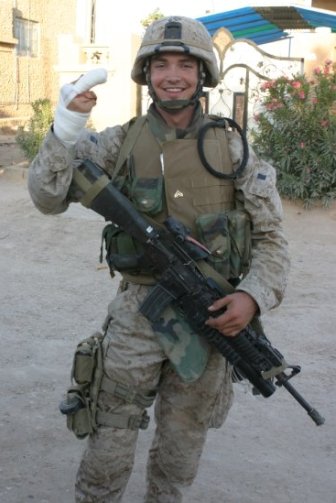Guns and duty, once the combat tour ends
By Alex Keefe

Guns and duty, once the combat tour ends
By Alex KeefeJustin Wigg says it took about three years of being out of the United States Marine Corps before he stopped having the dream.
“You could ask just about any military vet if they’ve ever had ‘that dream,’ and they’ll know what you’re talking about,” Wigg, 28, explained one recent weeknight at his home in Schaumburg, Ill. “It’s that dream where you wake up in the middle of the night and you are like, ‘Oh s---, I don’t know where my rifle is.’”
But gone are the days when Wigg’s dreams are haunted by barking Marine Corps drill instructors, dressing him down for not having his rifle ready at all hours of the day. Now he’s got a corporate job, a suburban townhouse and a rambunctious brindle greyhound, named Sheriff.
And he still has a gun, albeit just one: A SIG Sauer P226 .40 cal. pistol he stows in a blue plastic case, tucked into his bedroom wardrobe – well out of arm’s reach.
Wigg is one of several people WBEZ is profiling as part of the series, “Our Guns.” It aims to document the different relationships local gun owners have with their firearms, as people across the country debate gun rights and gun control in the aftermath of mass shootings in Newtown, Conn. and daily gun violence here in Chicago.
After serving two tours in Iraq, Wigg said not carrying a gun when he first left the Marine Corps made him feel kind of naked. (Think: forgetting your cell phone at home, or driving without a seatbelt.)
His itch to carry a gun was stifled, he said, by the fact that Illinois is the only state in the U.S. that does not allow people to carry concealed weapons. A lot of his buddies from other states started carrying when they got out of the service, Wigg said.
“And part of it probably is because of that - that dream feeling,” he said, adding his friends now think: “’I’ve had a gun stuck to my hip for the last four years, and why - why not just go buy a pistol and keep myself calm with that sense of safety?’”

The town in which we were raised – northwest suburban Roselle, Ill. – is the kind of place where most of the kids I knew had never even fired a gun. Wigg says his first time wasn’t until basic training.
‘Luckiest person in Iraq’
When I visit his home, Wigg pops in a DVD to show me – a kind of video scrapbook of his time in the Marines, set to rock music and rap.
In one scene, camouflaged Marines slide down ropes trailing from a low-flying helicopter. In another, guys in full gear are shooting at targets shaped roughly like human silhouettes. A big part of all this training – the long hours at the shooting range – is safety.
Wigg points to a scar on his right middle finger. This is where a bullet went clean through his flesh while on patrol one day in Iraq, without breaking a bone.
The shot was accidental, fired from the rifle of a fellow Marine who wasn’t following safety protocol.
“It’s extremely amazing,” Wigg said, admiring that his finger still functions normally. “The doctor said that I was the luckiest person in Iraq that day that I still had my finger attached.”
Training
He carried a loaded gun as part of his job, for months on end, to guard against the very real danger that somebody would try to kill him.
He was trained until his gun became an extension of his body, trained until the training itself crept into his dreams. And he was trained to do what many hunters and sportsmen are trained not to do: Shoot other people.

This answer is not “P.C,” he laments. But that lack of emotion, he called it “dehumanizing,” was part of his training, too.
Now that he’s out of the Marine Corps, he says he’s able to think of his enemies differently.
“I know that they all have the same feelings and families and things like that,” Wigg said. “And that’s just - that’s part of war and that’s the stuff that you - you don’t have time to think about at the time, and you spend the rest of your life dealing with.”
‘When the good guys are armed’
On a recent weeknight, I met Wigg at an indoor range in Lombard, Ill.
“[With] good ammo, you don’t get the taste, you just get that good, nostalgic smell that you think of,” he shouted over the sound of gunfire, in between turns shooting at the paper target downrange.

He and a buddy, another ex-Marine,- argue over who shot which holes through a black, silhouette-shaped paper target.
“After a stressful day, you know, this is a really good way to just blow off some steam,” Wigg explained. “It’s good guy time to just shoot the s---, make fun of each other.”
But for Wigg, this is more than just a night with the guys. He believes carrying a concealed weapon is a right, that someday he hopes to exercise in Illinois. His military training could be an asset if he were ever witness to a crime, and needed to act, he said.
“Your chances are better when the good guys are armed than when it’s just bad guys with guns,” he said.
Wigg says that familiar refrain – “only a good guy with a gun, can stop a bad guy with a gun” – appeals to his sense of duty, even if he no longer wears a uniform.